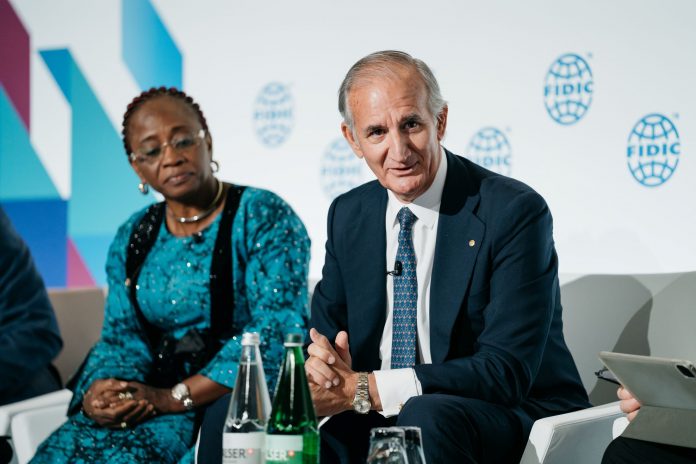
Good preparation, honest dialogue and teamwork are the key component parts to good contracting.
The post-Covid catch-up was creating challenges with supply chain shortages and restructuring of markets together with rising costs, inflation and global events which were making the task of good procurement and contracting more challenging than before, said international judge and arbitrator Sir Vivian Ramsay speaking at a FIDIC Global Infrastructure Conference session on Procurement and contracting for success – Getting procurement right and de-risking investment and delivery on 13 September 2022.
“The industry has become more conscious of risk but whether it is better at managing it, I will leave for others to decide,” said Ramsay. He said that there was a high risk in the design area due to increasing complexity and number of stakeholders involved. Project risk was acute as were political and also local cost and time risks and insolvency risk, so it was a complex picture all round for those working in construction to navigate, said Sir Vivian.
Asked about the use of FIDIC contracts around the world, Sir Vivian said that FIDIC’s qualifications and accreditation programmes would be enormously beneficial in increasing take up of the organisation’s contracts. The FIDIC Credentialing initiative had a key role to play in that process, he said and the more people who went through the programme, the more FIDIC contracts would be used internationally. “We are now in a climate where risk is changing and the risk of climate change deserves special attention,” he said.
Speaking at the session, chaired by FIDIC president Luis Villarroya Alonso, Aramide Adeyoye, special adviser to the governor on works and infrastructure for the Lagos state government in Nigeria, said that public bodies were focused on getting value for money from the procurement process and Lagos was focused on that too. How consultants and contractors are selected is important and it was important to learn lessons from bidding and selection processes that had not worked in the past, Adeyoye said. This was important as it fostered belief in the procurement process from all those using it.
According to Anthony Bouchard, president and chief operating officer of CDM Smith, project success was when owners or clients exceeded or met their expectations and created a valuable asset for users. “Unachievable schedules, unbalanced contracts and lowest price contracting were the enemy of successful projects” and everything should be done to mitigate these risks. It was also incumbent on clients to do proper due diligence on the organise they work with and effective quality management programmes were an essential part of that, he said.
Offering a perspective from the insurance industry, Michael Earp, architects and engineers practice leader at Aon, talked about the three ‘i’s – inflation, infrastructure and innovation. Firstly, he warned the industry about rising inflation, which he said would put pressure on project and insurance costs going forward.
Secondly, he said that getting the risk profile on infrastructure was crucial in creating a climate for project success. Earp also issued a warning about the attitude of the insurance sector to innovation, which was something they were somewhat nervous about and companies needed to have the right insurance in place to cover all eventualities.
Fidel Saenz De Ormijana, chief technical officer at Ferrovial, agreed with Earp that insurance could not be seen as a panacea and that players “needed to do their homework”. Risk management was an holistic process, he said, and no matter who was responsible, failure affects all project participants.
“It’s important for project owners to talk confidentially with project players and take a strong lead,” which means they need good advance and that’s where the engineer comes in said De Ormijana. “When a project gets to procurement stage then they need to have done their homework too,” he said.

















